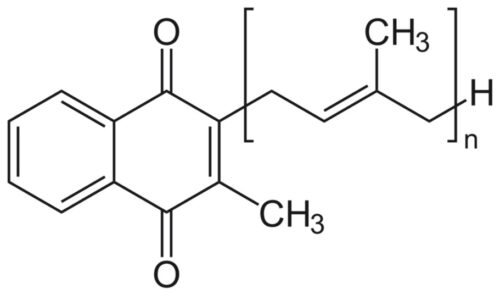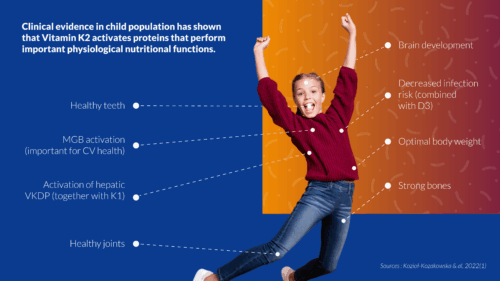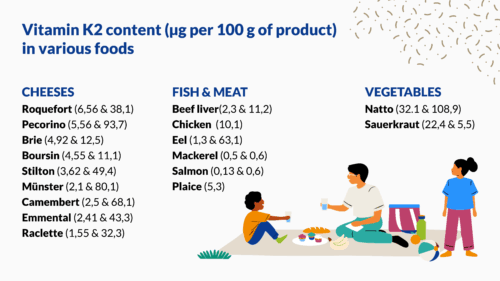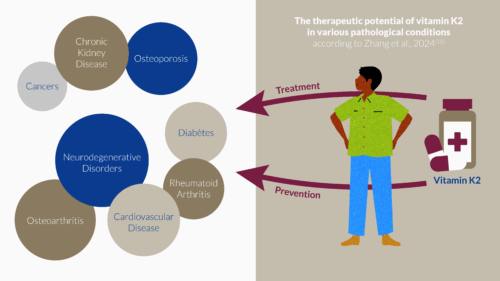In this article, we’ll take a closer look at vitamin K2, its role in the body and its proven health benefits, as well as the different food sources and supplements that contain this valuable nutrient.
The different forms of vitamin K
Discovered in 1929, vitamin K began to interest the scientific community when researchers discovered its important role in blood coagulation. Vitamin K exists in two main forms: K1 and K2.
Where is vitamin K found?
- Vitamin K1 is found in green leafy vegetables such as kale, spinach, broccoli and Brussels sprouts.
- Vitamin K2 is found in animal-based foods, but also in fermented foods not commonly found in the modern Western diet. This is the case, for example, with nattō, a traditional Japanese food made from fermented soybeans, which is rich in K2. Vitamin K2 is also synthesized by the bacteria of the intestinal flora.
While vitamin K1 plays an essential role in blood clotting, vitamin K2 contributes to strong bones and a healthy heart. Compared to vitamin K1, vitamin K2 performs more functions and has higher efficacy and bioavailability.
What is vitamin K2?
Vitamin K2 belongs to the group of fat-soluble K vitamins. Also known as menaquinone, vitamin K2 is chemically a naphthoquinone with an isoprenic side chain of 4 to 14 isoprene units. Vitamin K2 thus comes in a series of compounds: from menaquinone-1 (MK-1) to menaquinone-14 (MK-14). The most common and scientifically studied forms are vitamins K MK-4 and MK-7. The most biologically active form is menaquinone-7 (MK-7).

The role of vitamin K2 in the body
Why is there growing interest in vitamin K2 worldwide? As a result of changing dietary habits in developed countries over the last five decades, the vitamin K intake of both adults and children, and more specifically vitamin K2, has fallen considerably, with serious consequences for health. The medical community is now more aware of these deficiencies. Today, more than 22 clinical trials have demonstrated the beneficial role of vitamin K2 for bone strength and heart health. These studies used MenaQ7″, explains Xavier Berger, Global Market Manager at Gnosis by Lesaffre, a business unit specializing in human health and nutrition
Often linked to age, the risk of cardiovascular and bone disease increases with life expectancy. In this context, vitamin K2 could help to meet a major global health challenge: living longer and in better health.
The health benefits of vitamin K2
Vitamin K2 supplementation therefore offers health benefits across all age groups. A trial conducted on post-menopausal women showed that taking vitamin K2 in the form of MK-7 (180 μg of MenaQ7® per day) could significantly increase bone strength and density within three years. This is an important finding, given that one in three women over the age of 50 will suffer an osteoporotic fracture in her lifetime. Today, vitamin K2 is often combined with vitamin D3 and marketed in the form of dietary supplements. The two vitamins work in synergy: vitamin D3 promotes calcium absorption, while vitamin K2 ensures that calcium is deposited where it’s needed.
Here’s another example of the benefits of vitamin K2, this time for cardiovascular health. Vitamin K2 helps prevent calcification (or hardening) of the arteries. It activates a protein that eliminates excess calcium and prevents it from accumulating in artery walls. Over a 9-year period, a trial involving 4,800 people showed that daily vitamin K2 intake could reduce the risk of coronary heart disease, and was inversely associated with the risk of all-cause mortality, as well as with cases of severe aortic valve calcification.
Vitamin K2 is also beneficial for children and plays an important role in their overall health, promoting bone mineralization and the development of a healthy cardiovascular system.
Redraw diagram (after Kozioł-Kozakowska & al, 2022(1))

Need for adequate vitamin K2 intake
We used to think that vitamin K deficiency didn’t exist. Today, we know that this is only true for vitamin K1. Our diet is low in vitamin K2, and our intestinal bacteria don’t produce enough of it. As a result, the vast majority (97%) of the Western population appears to be deficient in vitamin K21. Studies therefore suggest that a higher intake of vitamin K2 is essential for our bodies. Current recommendations from health authorities are based exclusively on an adequate intake of vitamin K1 to regulate blood coagulation. However, recent studies have shown the importance of vitamin K2 for bone strength and heart health. In 2001, the US Food and Nutrition Board set the recommended daily intake of vitamin K at 120 µg for adult men and 90 µg for adult women. But the latest research on vitamin K2 has shown that a daily intake of 180 µg for all adults would be more appropriate.
How to get the best sources of vitamin K2
To reap the full benefits of vitamin K2, it’s essential to identify the best food sources and forms of supplementation that contain this nutrient. Here’s how to add vitamin K2 to your daily diet.
Foods rich in vitamin K2
The best food sources of vitamin K2 are as follows.
- Fermented foods, such as nattō or fermented milk drinks.
- Foods of animal origin, such as goose liver and meat, egg , butter, salami, chicken fillets or pork liver,
- Types of cheese, such as Edam, Emmental and Gouda.

The best vitamin K2 supplements
Vitamin K2 is available in a variety of supplement forms, including tablets, drops, fortified drinks, gums, dairy products and powdered formulas (for athletes).
Vitamin K2 is also available in supplements containing MK-4 and MK-7, two different forms of K2. MK-7 is better absorbed by the body and plays a more important role in activating osteocalcin, a protein that helps strengthen bones, and in activating matrix protein GLA, a powerful inhibitor of arterial calcification (2).
The science behind vitamin K2 and its mechanisms
Scientific research has led to a better understanding of how vitamin K2 functions in the body.
The role of vitamin K2 in calcium regulation
Vitamin K2 activates proteins that play a role in regulating the absorption and distribution of calcium in the body. Osteocalcin, in particular, ensures calcium binding to bones, while the matrix protein GLA, present in blood vessel walls, helps prevent their calcification.
Vitamin K2 deficiency means that these proteins are not activated, resulting in low calcium levels in the bones and its accumulation in the arteries, thereby increasing the risk of heart disease(3).
Evidence of vitamin K2 efficacy
Numerous studies have demonstrated the medical benefits of naturally fermented vitamin K2, known under the brand name MenaQ7. Among the most significant scientific studies are the following:
- A study showing the positive effects of three years’ menaquinone-7 (MK-7) supplementation on cardiovascular health(4()) (Knapen MHJ et al. 2015).
- A study showing the positive effects of three years’ menaquinone-7 (MK-7) supplementation on bone health(5) (Knapen MHJ et al. 2013).
- A study showing that drinking yogurts fortified with menaquinone-7 can improve vitamin K status in a healthy population(6) (Knapen MHJ, et al. 2015).
- A study showing that high vitamin K2 intake reduces age-related vascular stiffness in just one year(7) (Vermeer C et al. 2020).
Some studies also suggest that vitamin K2 may exert remarkable anti-cancer activity on various cancer cell lines.
The anticancer function of vitamin K2 is thought to be linked to glucose metabolic regulation. According to Duan & al (2020), vitamin K2 could induce metabolic stress and trigger autophagic cell death in bladder cancer cells by promoting glycolysis (8). Further studies are needed to confirm whether – and in what way – vitamin K2 can protect against cancer()(9).

Dosage, safety and side effects of vitamin K2
It’s important to understand the appropriate dosage and the necessary precautions to take before incorporating vitamin K2 into your diet. Although it is generally well tolerated, misuse of this nutrient can reduce its effectiveness or interact negatively with other medications.
How much vitamin K2 should I take
Although health authorities have not issued specific recommendations for daily vitamin K2 intake, recent studies suggest that a daily dose of 180 mcg may be beneficial to the health of adults. This dosage was demonstrated in one of the clinical studies of MenaQ7(5).
For example, a daily intake of 180 mcg vitamin K2 MK-7 not only improves arterial stiffness, but also increases bone mineral density and prevents bone loss, which can lead to osteoporosis in postmenopausal women(4())).
In addition, research has shown that two years’ supplementation with 45 μg of MK-7 boosted bone density and strength in children aged 6 to 10(11).
Side effects and potential risks
Vitamin K2 has no known side effects when taken in the form of dietary supplements at recommended doses and after consulting a physician. .
The only contraindication is the use of coumarin derivatives (e.g. Warfarin) as oral anticoagulants(10).
Today, there is a new generation of anticoagulants which are not vitamin K antagonists, and which can be combined with vitamin K2.
Find out more about the myths surrounding vitamin K2.
Vitamin K2 deficiency and symptoms
Although intestinal bacteria synthesize a large quantity of menaquinones, the bioavailability of bacterial menaquinone is generally poor, so food is the main source of K. Unfortunately, vitamin K2 is largely absent from Western diets and eating habits, which means we don’t get enough of this nutrient and are at risk of developing vitamin K2 deficiency.
Symptoms of vitamin K2 deficiency
Vitamin K2 deficiency can cause a number of symptoms, such as :
- Arterial calcification, where an accumulation of calcium can harden arteries and increase the risk of heart disease. Insufficient vitamin K intake is thought to be associated with an increased risk of hospitalization for atherosclerotic cardiovascular disease (ASCVD)but future clinical trials will need to confirm the link between vitamin K and ASCVD(12()).
- Bone disorders such as osteoporosis, a bone-weakening disease that particularly affects the elderly, increasing their risk of bone fracture.
- Vitamin K2 helps maintain tooth mineralization, so a deficiency can lead to brittle teeth.
- Blood coagulation problems, leading to easy bruising or excessive bleeding.
Who is exposed to the risk of deficiency?
Certain categories of people are more at risk of developing vitamin K2 deficiency, notably those suffering from chronic inflammatory bowel disease (IBD), such as Crohn’s disease, whose absorption of fat-soluble vitamins like K2 is diminished(13)– but also the elderly and people on anticoagulants (coumarin derivatives) or certain types of medication that can impair bowel function. The same applies to people whose diet is low in vitamin K2, notably vegans and vegetarians.
Vitamin K2: a wide range of potential applications
Today, vitamin K2 is available in the form of dietary supplements. It is also found in functional foods and beverages such as sports supplements, protein powders, infant formulas, soft drinks and chocolate bars. “We are constantly striving to innovate and adapt to new consumer habits”, added Xavier Berger. A pioneer in the development of vitamin K2, Gnosis by Lesaffre today offers the most comprehensive range of products on the market. The Lesaffre business unit will continue to research and promote the benefits of this essential health nutrient.
Vitamin K2 is essential for maintaining strong bones and a healthy heart, and its health benefits are backed up by extensive scientific research. If you wish to increase your daily intake of vitamin K2, there are many forms of dietary supplements and fortified products available on the market. Be sure to consult a healthcare professional to determine the right dosage for your individual needs.
Frequently asked questions (FAQ)
Can vitamin K2 be taken daily?
Yes, vitamin K2 can be taken every day to minimize the risk of deficiency. Ask your doctor for advice.
Is vitamin K2 safe for children and pregnant women?
The absence of side effects makes vitamin K MK-7 an ideal supplement for pregnant and breastfeeding women, as well as for children over 3 years of age. However, as vitamin K2 is an active substance, it is advisable to seek the advice of your doctor
Can vitamin K2 help with sleep or mood disorders?
To date, there is no evidence to suggest that vitamin K2 has a positive effect on sleep or mood disorders. Numerous studies are underway to better understand its overall effects on the body.
Sources :
- Kozioł-Kozakowska, A.; Maresz, K. The Impact of Vitamin K2 (Menaquionones) in Children’s Health and Diseases: A Review of the Literature. Children 2022, 9, 78. https://doi.
- Sato T, Inaba N, Yamashita T. MK-7 and its effects on bone quality and strength. 2020 Mar 31;12(4):965. doi : 10.3390/nu12040965.
- Maresz K. Proper Calcium Use: Vitamin K2 as a Promoter of Bone and Cardiovascular Health. Integr Med (Encinitas). 2015 Feb;14(1):34-9.
- Knapen MH, Braam LA, Drummen NE, Bekers O, Hoeks AP, Vermeer C. Menaquinone-7 supplementation improves arterial stiffness in healthy postmenopausal women. A double-blind randomised clinical trial. Thromb Haemost. 2015 May;113(5):1135-44. doi: 10.1160/TH14-08-0675.
- Knapen MH, Drummen NE, Smit E, Vermeer C, Theuwissen E. Three-year low-dose menaquinone-7 supplementation helps decrease bone loss in healthy postmenopausal women. Osteoporos Int. 2013 Sep;24(9):2499-507. doi: 10.1007/s00198-013-2325-6.
- Knapen MH, Braam LA, Teunissen KJ, Zwijsen RM, Theuwissen E, Vermeer C. Yogurt drink fortified with menaquinone-7 improves vitamin K status in a healthy population. J Nutr Sci. 2015 Oct 16;4:e35. doi: 10.1017/jns.2015.25.
- Cees Vermeer and Hogne Vik (2020) Effect of Menaquinone-7 (vitamin K2) on vascular elasticity in healthy subjects: results from a one-year study. Vascul Dis Ther, 5: doi: 10.15761/VDT.1000179.
- Duan, F., Mei, C., Yang, L. et al. Vitamin K2 promotes PI3K/AKT/HIF-1α-mediated glycolysis leading to AMPK-dependent autophagic cell death in bladder cancer cells. Sci Rep 10 , 7714 (2020). https://doi.
- Xv F, Chen J, Duan L, Li S. Research progress on the anticancer effects of vitamin K2. Oncol Lett. 2018 Jun;15(6):8926-8934. doi: 10.3892/ol.2018.8502.
- Zhang, T.; O’Connor, C.; Sheridan, H.; Barlow, J.W. Vitamin K2 in Health and Disease: A Clinical Perspective. Foods 2024, 13, 1646. https://doi.org/10.3390/foods13111646
- van Summeren MJH, Braam LAJLM, Lilien MR, Schurgers LJ, Kuis W, Vermeer C. The effect of menaquinone-7 (vitamin K2) supplementation on osteocalcin carboxylation in healthy prepubertal children. British Journal of Nutrition. 2009;102(8):1171-1178. doi:10.1017/S0007114509382100
- 2013 Jun;11(6):1085-92. doi: 10.1111/jth.12203. PMID: 23530987.
- Yue Wu, Hong-Ju Xiang, Min Yuan, An L-shaped relationship between dietary vitamin K and atherosclerotic cardiovascular disease, Clinical Nutrition ESPEN, Volume 61, 2024,Pages 385-392, ISSN 2405-4577, https://doi.org/10.1016/j.clnesp.2024.03.031.
- Lai Yujiao , Masatoshi Hori , Ma Yanbo , Guo Yuming , Zhang Bingkun, Role of Vitamin K in Intestinal Health, Frontiers in Immunology, Volume 12 – 2021, https://doi.org/10.3389/fimmu.2021.791565


